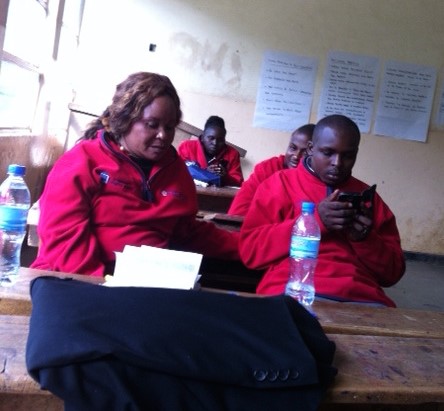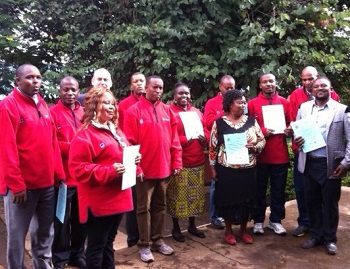
Teacher training: Arusha's sports leaders exploring development options
Making a difference in Tanzania
Earlier this year Chris Cutforth spent 10 days in Tanzania as part of the UK Sport International Inspiration IDEALS programme. Here he shares his experiences of delivering a training programme for local sports teachers, the impact of the training, and the personal and professional development benefits of being involved.

Teacher training: Arusha's sports leaders exploring development options
Working as a sports lecturer at Sheffield Hallam University has enabled me to become involved with UK Sport's IDEALS programme. IDEALS is a partnership between UK Sport and the National Sports Council of Tanzania which aims to establish high-quality, progressive and coordinated sports leadership development exchange programmes for young people aged 20 to 35. Established in 2006, the programme has grown significantly and now operates in Ghana and Tanzania and involves seven UK universities. Every year each of the universities sends between four and eight students to undertake their work placements in one of the two countries. This involves them leading and coaching sports in local communities while also immersing themselves in the local culture.
For the past three years I have accompanied my students for a period of a week on their placements in Arusha, Tanzania. Last year while in Arusha I was asked to lead some training sessions with a small group of sports teachers. Despite minimal preparation on my part, the teachers seemed to value and appreciate the training so we decided to plan something on a larger scale this year. I wanted this year’s programme to be based more on the identified needs of the teachers as well as improving the content and delivery of the training.
The planning for this year’s programme began in March when I identified a list of topics which I felt reasonably comfortable to cover based on my professional background and experience. I am not a qualified school teacher and have never worked full time in a school but prior to joining Sheffield Hallam University I spent 20 years working in community sport development in the UK, mostly with local authorities and Sport England. During my time at Sport England I managed a variety of PE and school sport initiatives as part of the Active Schools programme. This involved working extensively with PE teachers, headteachers and PE advisers. I felt this experience meant that I had something useful to offer to the teachers in Arusha. The local teachers were consulted on my ideas and asked to identify their preferences. My list of 15 topics was narrowed down to just five and so the training programme was decided.
I remember feeling a mixture of excitement and apprehension at this point about what I had taken on. The apprehension was due to my desire to provide the teachers with a meaningful training programme, but I also knew I would have limited time to prepare. The cultural context of Tanzania was an additional challenge; I had some knowledge of this as a result of my two previous visits but I felt I needed to know more, particularly about the status and profile of PE and sport in Tanzanian schools and how it is taught, as well as wider cultural influences. I began to realise at this point that if the programme was going to be successful I would need assistance from other people, in particular my contacts in the National Sports Council of Tanzania, my PE colleagues at the university and my older brother, who is a university professor in the United States and a former PE specialist. My next priority was to make them aware of my plans and secure their involvement and support.
During a few spare moments in late March and April I began planning the programme. This involved establishing the learning outcomes, liaising with colleagues who had offered their support and sourcing a wide variety of PE and sport resources which I felt might be useful. I also sent a list of questions to my colleague in the National Sports Council of Tanzania so that I could understand more about the cultural context I would be working in and build this into my planning. I became aware at this point that PE is not a compulsory subject in Tanzanian schools so most of the sports provision is provided outside of school lessons. Alongside this, the place of girls in Tanzanian families and society is very different from the UK and attitudes towards disability, although changing, are not always positive. In addition the facilities, equipment and training available to teachers are very limited. Receiving this insight was very helpful in designing the programme. I knew I had to be sensitive to these issues and realistic when discussing possible enhancements in provision.
I arrived in Arusha on 2 May with an embryonic training programme in my suitcase and a wide variety of resources at my disposal. I still had a lot of work to do to finalise the programme and feel ready and confident to deliver it. The excitement and apprehension seemed to grow exponentially at this point! Over the next five days, while supporting my students with their induction programme, I planned and delivered five two-hour workshops to 20 primary and secondary school teachers on the following topics:
Each session was loosely structured around a simple self-evaluation and action planning model which required the teachers to reflect upon and discuss their current provision and practice, visualise a better future, identify the barriers and enablers, and identify some actions for improvement. Time was spent in each session looking at relevant examples from the UK, including the Youth Sport Trust’s special educational needs (SEN) inclusion games, inclusive primary school festivals resources, UK School Games Inclusive Competition formats, Sport Scotland’s Fit for Girls Programme, and research findings from Women in Sport and Loughborough University's Institute of Youth Sport's research on engaging girls in PE, sport and physical activity. With each of these examples the teachers were encouraged to identify which aspects could be adapted and/or replicated in their schools, taking into account the status of PE, the very different cultural context and the inevitable resource constraints. I also included within the training a number of practical games and activities. These were designed to introduce a bit of fun while highlighting some of the issues being discussed. Many of the activities were suitable for children, a point that was emphasised to the teachers.
I am pleased to say that the feedback from the teachers was very positive. They all seemed to enjoy the training, found it interesting, helpful, challenging, even motivational and inspiring. Whether this was anything to do with the sweatshirts I had given them all at the start of the week or the certificates at the end I am not quite sure! Pleasingly for me, they also promised to implement all of the actions they had agreed individually and as a group in the final session.
I am hoping to return to Arusha next year to do some further work with the teachers. There are also an additional eight schools in Arusha who have recently joined the IDEALS programme so we hope to be able to involve them next year too.
For me this was a thoroughly enjoyable and worthwhile experience, if a little daunting at times. Spending time with such a lovely group of dedicated teachers who are clearly working in very difficult circumstances was so humbling and rewarding. I hope I have managed to teach them a few things that they can implement in their schools. I also hope that my involvement will have encouraged them to collaborate more with each other in the future.
Christopher Cutforth is a senior lecturer in sport at the Sheffield Hallam University Academy of Sport and Physical Activity and chair of the European Sports Development Network (ESDN)
Special thanks must be given to the following people for their assistance in the planning of this training programme:
Chris is willing to discuss his Tanzania experiences in more detail. He can be contacted via c.cutforth<at>shu.ac.uk or by phone on 0114 2255626.
The Leisure Review, October 2015
© Copyright of all material on this site is retained by The Leisure Review or the individual contributors where stated. Contact The Leisure Review for details.
![]() Download a pdf version of this article for printing
Download a pdf version of this article for printing
